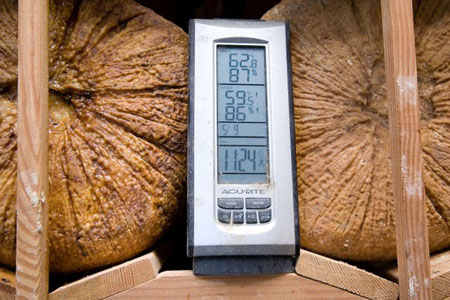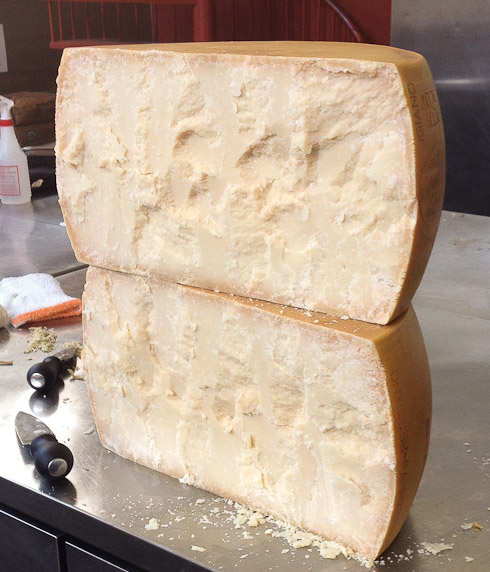Where's My Favorite Cheese? Raw milk, pathogens & the FDA.
 Picture this: You walk into your favorite cheese shop. It's the one whose mongers eyes light up because they can't wait for you to sample their new small-batch wheel from Missouri or Sonoma that just arrived. It's the shop that taught you that not all Roquefort is created equal. It's the one that stresses that Gruyere and Comté are not the same cheese made in two different countries, and it's the one that doesn't try to sell you pre-grated low-moisture mozzarella for your pizza when you really want the balls that bob in water. In short, it's the one that has been supporting, educating, and fulfilling your cheese cravings for years.
Picture this: You walk into your favorite cheese shop. It's the one whose mongers eyes light up because they can't wait for you to sample their new small-batch wheel from Missouri or Sonoma that just arrived. It's the shop that taught you that not all Roquefort is created equal. It's the one that stresses that Gruyere and Comté are not the same cheese made in two different countries, and it's the one that doesn't try to sell you pre-grated low-moisture mozzarella for your pizza when you really want the balls that bob in water. In short, it's the one that has been supporting, educating, and fulfilling your cheese cravings for years.
Things at this shop might be different the next time you walk in.
If you had asked me a year or two ago which direction the cheese industry was going in the United States, I would tell you that things were getting better by the day. They were already pretty awesome. Our cheesemakers are making the best cheese that this country has seen. Distributors are looking beyond the big brands to bring in smaller producers. Those who are selling, making, storing, or writing and teaching about cheese's deliciousness are highly passionate, and educated. Cheesemonger certification exams and recent books are schooling folks in cheese science, proper storage, and culture and history. Harvard microbiologists are holding hands with artisan cheese companies. Things seem to be looking up. Right?
Well, it's a little bit of touchy topic right now. It's an interesting, hopeful, and sometimes scary time to be in the cheese biz. For consumers, it could be a sad time to walk into your favorite cheese store if you have your heart set on something particular made with raw milk- like Roquefort for example. New FDA regulations and testing methods are re-dictating what cheese will be in your favorite shop at any one time.
Domestic and Imported Cheeses Both Affected
Remember that scare about the FDA possibly outlawing the aging of cheese on wooden boards in the make-room even though using wooden boards to age cheese is a practice that's been traditionally keeping cheese safe and tasty for years? Well, the FDA backtracked because of petitions sent to the government and the attention paid in the press, much of which damned what the FDA was trying to do. However, hundreds of cheesemakers who built their caves based on board aging thought their business was in peril, and while the FDA backtracked, they didn't declare specifically that aging on boards was determined to be officially safe. They said that more research was needed. Could this issue come up again? Quite possibly, depending on what research the FDA consults or does, and who they hire to do it. Just a few cheeses this could affect: Parmesan, Comté, Dunbarton Blue, Fat Bottom Girl. This isn't just a domestic cheese issue.
Next, the FDA changed their allowance for Microbial Contaminants in cheese in 2010 to allow much smaller amounts of possible microbial pathogens in a finished cheese. They did this under the radar. Why is this a problem? Think of it this way.
A wheel of cheese is a symbiotic life form. It's fermented, and it's made up of proteins, fat, yeasts, molds, enzymes, and beyond. These things, in healthy amounts, are good. In the cheesy symbiotic life form, certain yeasts and bacterial microbes act as safeguards to keep some bad bacteria out or other bacterias in lower counts. This is similar to how planting good plants in an organic vineyard discourages certain pests, or helps to keep the bad, nutrient-leaching weeds that threaten the structure of a vine out. That is to say, microbes are inherently in cheese and even bacteria whose names people can fear can be perfectly safe in small amounts.
So when the FDA changes their microbial allowances, this throws everyone off. According to some, it's not too difficult to make a raw milk aged cheese to fit their regulations. But making a softer, younger raw milk cheese that meets their guidelines is incredibly difficult because it has such a high moisture content. You can't just make a cheese with, say, less non-toxic E. Coli because it would change the structure, taste of the entire cheese. Some American cheesemakers like Andy Hatch of Uplands have decided to stop making such delicious creations like the soft, raw-milk Rush Creek entirely this year, mainly because if the FDA recalled a batch after testing, say because it had even too much of a ton-toxic pathogen according to 2010 FDA guidelines, such a recall could threaten the economic future of a creamery.
What are these tests like?
When the FDA pulls samples, they buy a wheel at wholesale cost to sample. Sometimes it takes as long as three weeks before a cheesemaker gets test results back- in the mailbox. While that cheese is being tested, most cheesemakers hold off on selling other wheels from that batch because if by chance the batch were re-called, they'd have to recall everything they sold from that batch from shops, distributors, and homes.
Unfortunately, if a cheesemaker decides to hold a batch while it's being testing for three weeks or so, and say it's a raw-milk soft cheese, that batch will become another cheese animal while it's sitting and waiting for test results. By the time it hits the distributors, then shops after that, it might be over the hill. That's a huge loss if an entire batch of cheese can't be sold. Rather than face potential loss, disappointed customers, or messing with the integrity of the cheese, some cheese makers are deciding not to make certain cheeses until FDA testing or standards change. Which means that we may have to say goodbye to some of our favorite cheeses for the time being.
But it doesn't stop at domestic cheese, or even in a cheesemaker's cave.
The FDA is pulling cheese, raw-milk in particular since the FDA has decided it's more threatening (for the most part, I highly disagree) at all stages in cheese's life- both domestic and international. They do it from the cheesemaker's make room and cave, from the distributer, and then again from the cheese shop.
Lately, a huge amount of raw-milk cheeses have been pulled aside from France as soon as they hit the docks and have been kept for testing. Then the next batch is tested after it comes in again from that same distributer/affineur from France. Result- by the time cheese gets to the distributers, the cheese has changed. Often it's not up to par or what affineurs or cheesemakers want it to be. Because of this, some affineurs have stopped are are considering halting shipping to the U.S. altogether.
And oh yeah, remember Roquefort? Do you remember anyone hearing anyone getting sick from raw-milk Roquefort? Me neither. Well, it turns out this raw-milk, high moisture cheese most often has too high of non-toxic E.Coli count for FDA tests (under 10 parts per gram) and entire batches of it have been denied entry into the U.S.. Affineur Jean D'Alos no longer exports my favorite Roquefort (or any Roquefort) to the U.S. because of so many batches being turned away, and for the time being, even if I wanted to carry the classic cheese in the wine bar I manage, the only one I can acquire is made from pasteurized milk. You can bet your bottom dollar it tastes different. From what I last heard, Jean D'Alos has halted shipping his creations entirely- at least to the west coast- for the time being.
How can we help?
The FDA has been talking to the American Cheese Society to better understand our industry. This is promising. Let's all encourage them to keep the conversation open, educational, and mutually beneficial. This isn't just about having all of our tasty foods available to us; it's about preserving tradition, foodways, freedom of choice, and supporting our friends, family, and economy through making sure its safe for them to sell what they devote their life to.
So! Sign all the petitions you can that encourage better and more thorough FDA research of microbial allowances, request that that they properly utilize current research out there (there's plenty in France), and that they change their testing procedures so that its more economically viable for cheesemakers. Feel free to share any petitions, links, or notes in the comments section. And remember, we have the power to influence!



